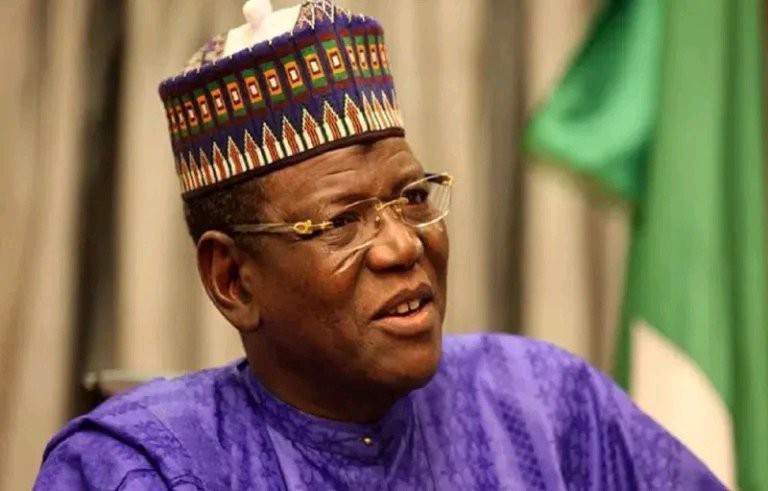According to Punch Newspaper, in a recently released autobiography, former Governor of Jigawa State and one-time National Secretary of the defunct Social Democratic Party, Sule Lamido, provided a personal account of a tense episode in Nigeria’s political history. The narrative, contained in his book Being True to Myself, focuses on the events surrounding the 2000 crisis in Lagos State, which led to the loss of many lives and properties. Lamido reflected on the violence that unfolded in Lagos during that period and recounted how he directly confronted the then Governor of Lagos State, Bola Tinubu, who is now Nigeria’s President. His reaction was driven by the extensive destruction witnessed during the fact-finding mission sanctioned by the federal government.
According to Lamido, the crisis in Lagos in 2000 saw attacks on Northerners and widespread damage to economic assets. He noted that the severity of the situation compelled then-President Olusegun Obasanjo to set up a ministerial committee to investigate the unrest and its implications. The committee was led by Hassan Adamu, the then Minister of Environment, and included high-profile government officials like the late Colonel Bello Kaliel, Ibrahim Bunu, and Sule Lamido himself. These individuals were tasked with visiting the affected areas, engaging stakeholders, and reporting back to the presidency. Lamido’s account brings to light the depth of the violence and the ethnic dimension it assumed.
Lamido recalled the committee’s visit to several flashpoints in Lagos, where they observed the impact of the crisis firsthand. He described the aftermath as both devastating and deliberate, stating that many trailers, tankers, and houses had been destroyed in areas predominantly inhabited by Northerners. During their tour, they observed a disturbing pattern of targeted destruction. Homes and properties were marked by ethnic identity — Hausa, Yoruba, and Igbo — but it was only those belonging to the Hausa that were razed. This selective pattern of violence gave Lamido the impression that the attacks were not just spontaneous but driven by economic sabotage and ethnic hostility.
The visit to Ajegunle was particularly striking for the ministerial team. In that locality, according to Lamido’s account, they encountered charred buildings and property destruction on a massive scale. The team noticed how houses had been identified and marked based on the ethnic background of the occupants, and entire clusters of Hausa homes had been reduced to rubble. This gave rise to concerns that the violence was not merely a random occurrence but an orchestrated effort to disrupt the economic activities associated with a particular ethnic group. The destruction of trucks and tankers — critical elements of the country’s supply chain — pointed toward a broader economic implication beyond just human loss.
Lamido’s anger during the fact-finding mission reached a point where he felt compelled to issue a stern warning to then-Governor Tinubu. The book narrates how he confronted Tinubu at a meeting and warned that if such targeted violence against Northerners occurred again, the federal government would have no choice but to impose a state of emergency in Lagos State. Lamido interpreted the attacks as economically motivated and aimed at weakening the influence and presence of Northerners in Lagos’s economic framework. His reaction, he explained, stemmed from what he perceived as a failure on the part of the state government to control or prevent such acts of aggression.
The incident also led the committee to pay a visit to the late Emir of Kano, Alhaji Ado Bayero. The visit served both as a gesture of consultation and solidarity with Northern traditional leadership. During their discussions, the ministers reaffirmed their commitment to the North and pledged to protect the interests of their people as part of their duties in public office. The meeting with the Emir also helped solidify the resolve of the committee members to confront the Lagos situation with the seriousness it demanded. It underscored the emotional and political weight the incident carried for Northerners who felt their people were under siege in another part of the country.
The 2000 crisis in Lagos marked one of several episodes of interethnic tension that have punctuated Nigeria’s post-independence history. The level of destruction and human suffering, as detailed by Lamido, reinforced the need for a more proactive approach to interethnic relations and state response to civil unrest. Lamido’s book captures the mood of the time and sheds light on the limitations of state interventions in situations where violence takes on an ethnic or economic dimension. The implication of threatening a state of emergency also reflected the depth of federal concern and the readiness to escalate matters if stability was not restored.
Lamido stated, “I got up and said: Please Tinubu, I swear by Allah if what we saw happens again, we will declare a state of emergency in Lagos. We have gone round, we have seen over a thousand vehicles – tankers and trailers burned down. So, the killing, the crisis, was targeted, it was economic, to destroy the economy of a particular area. We went to Ajegunle, we saw houses marked by tribe, Hausa House, Yoruba House, Igbo House and all Hausa houses were burned down.
Love Reading Authentic News Stories, Click The Button Below

